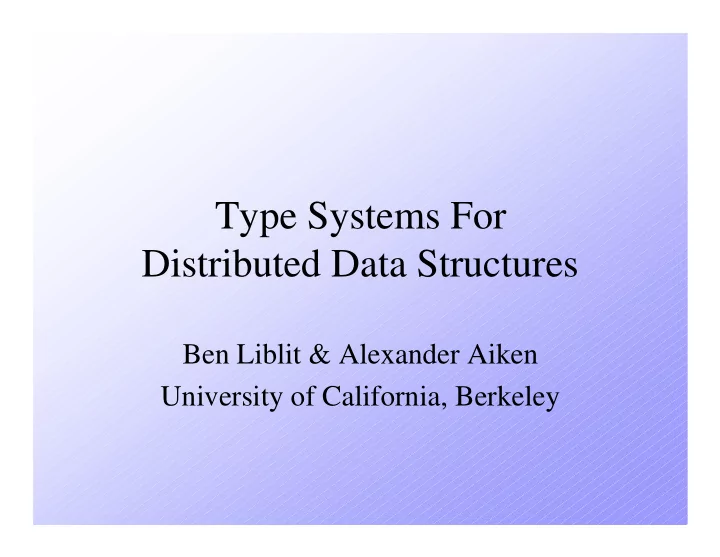

Type Systems For Distributed Data Structures Ben Liblit & Alexander Aiken University of California, Berkeley
Underlying Memory Model • Multiple machines, each with local memory • Global memory is union of local memories • Distinguish two types of pointers: – Local Local points to local memory only – – Global Global points anywhere: 〈 machine, address 〉 – – Different representations & operations
Language Design Options • Make everything global? � Conservatively sound � Easy to use � Hides program structure � Needlessly slow
Language Design Options • Expose local/global to programmer? � Explicit cost model � Faster execution � Naïve designs are unsound (as we will show) � Code becomes difficult to write and maintain � Conversion of sequential code is problematic
A (Possibly) Gratuitous Global A (Potentially) Unsound Local 7 8 5
Understand It First, Then Fix It • Study local/global in a simpler context – Design a sound type system for a tiny language • Move from type checking to type inference – Programmers see as much detail as they want • Apply findings to design of real languages – Type system detects & forbids “bad things” – Local qualification inference as optimization
Type Grammar :: local global ω = :: int boxed τ = ω τ τ × τ • Boxed and unboxed values • Integers, pointers, and pairs – Pairs are not assumed boxed • References to boxes are either local or global
Global Dereferencing: Standard Approach Unsound : boxed global τ x , where boxed local int τ = : ↓ τ x x = ↓ x = 5
Global Dereferencing: Sound With Type Expansion : boxed global τ x : expand( ) ↓ τ x x = ↓ x = 5
Global Dereferencing: Tuple Expansion • Type expansion for tuple components? • No: would change representation of tuple 8 x = ↓ x = 8 5
Global Dereferencing: Tuple Expansion • Solution: Invalidate local pointers in tuples • Other components remain valid, usable 8 x = ↓ x = 8 5
Global Tuple Selection • Starting at x , can we reach 5? • Yes, with a proper selection operator 8 x = 5
Global Tuple Selection • Selection offsets pointer within tuple 8 x = @2 x = 5
Global Tuple Selection • Selection offsets pointer within tuple • Global-to-local pointer works just as before 8 x = @2 x = 5 ↓ @2 x =
Extended Type Grammar :: local global ω = :: valid invalid ρ = :: int boxed τ = ω ρ τ τ × τ • Allow subtyping on validity qualifiers boxed valid boxed invalid ω τ ≤ ω τ τ × τ ≤ τ × τ ⇔ τ ≤ τ ∧ τ ≤ τ 1 2 3 4 1 3 2 4
Global Assignment : boxed valid global τ x : τ y : : = τ x y x = 3 5 y =
Global Assignment : boxed valid global τ x : expand ( ) τ τ = τ y : : = τ x y x = 3 5 y =
Type Qualifier Inference • Efficiently infer qualifiers in two passes: 1. Maximize number of “invalid” qualifiers 2. Maximize number of “local” qualifiers • Allows for a range of language designs – Complete inference – Allow explicit declarations as needed • On large codes, does better than humans!
Titanium Implementation • Titanium = Java + SPMD parallelism – Focus is on scientific codes • Global is assumed; local is explicit – E.g., “Object local” or “double [] local [] local” • Local qualification inference in compiler – Conservative for valid/invalid qualifiers – Monomorphic
Titanium Benchmarks: Speed 56% 60% Reduction in Execution Time 50% 42% 40% 27% 30% 20% 12% 6% 10% 2% 1% 0% lu-fact lu-fact cannon cannon sample gsrb pps manual auto manual auto
Titanium Benchmarks: Code Size 60% 50% 49% Reduction in Code Size 46% 50% 45% 43% 43% 40% 35% 30% 20% 10% 0% lu-fact lu-fact cannon cannon sample gsrb pps manual auto manual auto
Summary and Conclusions • For top performance, local/global must be dealt with • Soundness issues are subtle, but tractable – Analysis core is surprisingly simple • Type qualifier inference is a double win: – Programming is easier – Optimized code is faster, smaller
Recommend
More recommend